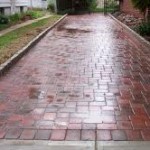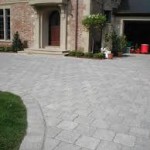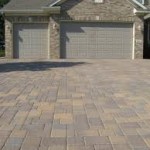It’s about 3:00am and you are sound asleep, suddenly you are awaken by a rumbling noise – then, you notice that the room is shaking and you can faintly hear things fall off shelves  and crashing to the floor in other rooms. Could it be? Yes, an earthquake. And unfortunately for you, your newly poured concrete driveway will also fall victim to this earthquake and have hideous fractures and cracks to prove the existence of the earthquake that so rudely awoke you in the night. If only you had chosen pavers, then you would not be facing having to rip out yards upon yards of concrete and essentially dealing with the hassle of construction all over again.
and crashing to the floor in other rooms. Could it be? Yes, an earthquake. And unfortunately for you, your newly poured concrete driveway will also fall victim to this earthquake and have hideous fractures and cracks to prove the existence of the earthquake that so rudely awoke you in the night. If only you had chosen pavers, then you would not be facing having to rip out yards upon yards of concrete and essentially dealing with the hassle of construction all over again.
The use of pavers are quickly becoming a very popular choice of materials for many reasons, as you probably guessed from our short story above, one of the primary reasons for their popularity is that pavers simply will not crack. Pavers do not crack because of the way that they are installed. In contrast to brick driveways or concrete driveways, pavers are held in place by a special type of sand. This sand allows the pavers to move ever so slightly in response to earth’s movement as well as extreme changes in the climate. Because concrete is a solid form, when any type of earth movement happens or if there are extreme changes in the climate, there is no way for the concrete to move or expand with this pressure. As a result, cracks are formed to release the tension in the material.
way that they are installed. In contrast to brick driveways or concrete driveways, pavers are held in place by a special type of sand. This sand allows the pavers to move ever so slightly in response to earth’s movement as well as extreme changes in the climate. Because concrete is a solid form, when any type of earth movement happens or if there are extreme changes in the climate, there is no way for the concrete to move or expand with this pressure. As a result, cracks are formed to release the tension in the material.
If you live in a region that freezes on a regular basis, special care must be taken when originally installing the pavers. For example, climate as well as the type of soil that the pavers are being laid upon determines how thick the layer of sand base should be. Areas that see a drop in temperatures that have a clay or silt base require that a thicker base of sand be used. In contrast, areas that are warmer and do not freeze require less of an initial base.
One of the beautiful aspects of pavers is that they come in a wide variety of colors, shapes and styles. Choosing a type of paver can be a difficult decision simply because of the vast  options that are available. A popular choice for driveway pavers are concrete pavers, when properly installed and maintained, concrete pavers can last up to twenty years. If you are looking for a type of material that is more durable and will withstand longer tests of time, they stone pavers or brick pavers might be the best option. Again, when installed correctly, these two types of pavers can last far beyond twenty-five years.
options that are available. A popular choice for driveway pavers are concrete pavers, when properly installed and maintained, concrete pavers can last up to twenty years. If you are looking for a type of material that is more durable and will withstand longer tests of time, they stone pavers or brick pavers might be the best option. Again, when installed correctly, these two types of pavers can last far beyond twenty-five years.
Our goal at Paver Search is to help individuals understand the various options that come with pavers. If you have any questions as to if pavers are the right material for you, we invite you to explore our website and see for yourself if pavers are the right fit for your construction project!
